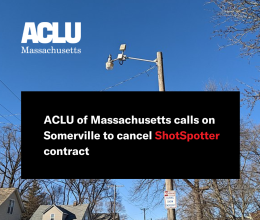
UPDATE: On April 8, 2016, the U.S. District Court for the District of Massachusetts unsealed the case identified in our motion. Our legal director Matthew Segal said:
"This is an important victory for open courts and open government. Vital issues about the security of our personal information should not be litigated behind closed doors. Yet, since at least 2008, that is exactly what was happening with the government’s efforts to force technology companies to access their customers' devices. We collected these cases and filed this motion because we believe that getting these issues right requires dealing with them openly.
"We filed our motion to unseal this case because we believe that the public's rights will not be respected if they are not litigated openly. Now that the government has agreed that this case should be unsealed, and now that a court has unsealed it, we hope that undue secrecy will not occur in the next case or in any other pending case. This was an important first step. Now that this basic information is publicly available, we will look closely at the documents to determine any potential next steps."
Transparency is more important than ever now that the government has dropped its request to force Apple to access data on a locked iPhone in the San Bernardino case. The FBI would have us believe that this attempt was exceptional.
But it was not. Research conducted by the ACLU of Massachusetts and the national ACLU reveals more than 60 cases in which the government invoked the All Writs Act to attempt to conscript Apple or Google to break into personal electronic devices. Going back as far as 2008, these requests span more than 20 states.
In some instances, an individual document was sealed or missing from the public index of a case, otherwise known as a docket sheet. But almost all of the cases included docket sheet entries that demonstrated the existence of an All Writs Act application or order or both. Not so in Massachusetts, where the ACLU discovered what we suspect is an entirely sealed docket associated with the government’s request for an All Writs Act order.
On March 31, 2016, the ACLU of Massachusetts filed a motion in federal court to make this docket public, which would reveal whether the government filed a formal All Writs Act application against Apple, whether it was opposed by the company, and whether it was granted by the Court. The public needs this bare minimum of information to better understand how government authorities have attempted to use the All Writs Act of 1789 to defeat 21st-century technology.
The government has made clear it will continue to seek broad authority to compel tech companies to access personal electronic devices. Such precedent would threaten both the data security of individuals and the entire system on which that security relies. This past month highlights why the conversation about digital security must take place in full view of the public. As the government tries to retreat back into the shadows in California, the ACLU’s motion seeks to shine a light on the government’s actions in the Commonwealth.






